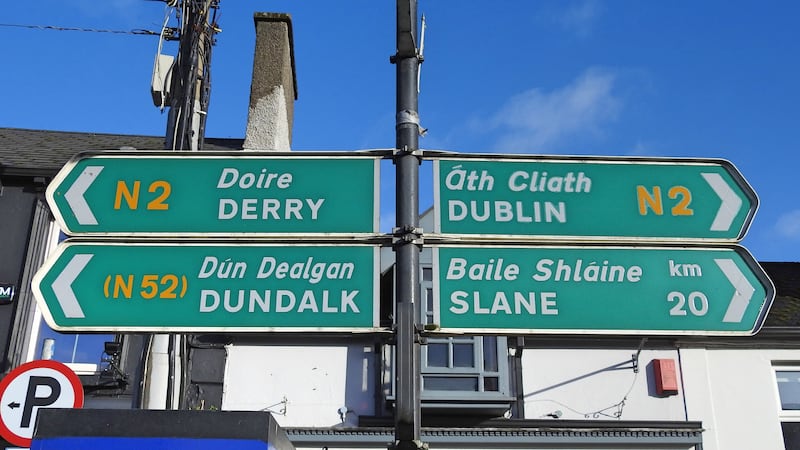A ban on Irish language street signs in Antrim and Newtownabbey Borough Council has been rescinded, the High Court has heard.
The decision to set aside the policy followed a challenge by a resident who claimed it amounted to discrimination.
Clare Duffy was also awarded legal costs as part of the resolution reached in the case.
Her supporters described the outcome as vindication of challenging a "Donald Trump-type policy".
The council said the policy "was not a ban in any way on the Irish language" but a new policy would be drafted for members to consider.
Ms Duffy issued judicial review proceedings after the council introduced a ban on bi-lingual signs earlier this year, claiming the move discriminated on grounds of religion, political opinion and cultural identity.
It was alleged the council failed in its duty to ensure equality.
In court yesterday, Barry Macdonald QC, representing Ms Duffy, said: The policy has now been rescinded on foot of the proceedings."
The development was confirmed in a letter following a council meeting last month.
On that basis Mr Justice McCloskey agreed to end the proceedings and make a costs order in favour of Ms Duffy.
She had been backed in her challenge by the Committee on the Administration of Justice (CAJ).
Outside court CAJ deputy director Daniel Holder said: "This was Donald Trump-type policy making by the council, rushing through a policy that was clear to the rest of us was unlawful and discriminatory and bypassing the duties in their own equality scheme in doing so."
He added: "We need to be vigilant that what replaces the policy respects human rights standards."
Ms Duffy's solicitor, Niall Murphy of KRW Law, said: "Our client expresses regret that ratepayers' money has been wasted on having to pay for the entirety of the costs of this High Court challenge at a time when rates in the borough have been recently increased by three per cent."
Sinn Féin councillor Anne Marie Logue also welcomed the decision.
Earlier this week Antrim and Newtownabbey councillors voted to refer Ms Logue to a standards watchdog after she revealed the council's u-turn in a tweet.
"Today's victory in the High Court highlights the lack of respect shown towards Irish identity and further focuses the need for the Acht na Gaeilge (Irish language act) to guarantee legal protections for the language," she said.
Dr Niall Comer, president of Irish language body Conradh na Gaeilge, said it has "consistently called for a uniformed approach to street-signage based on a local plebiscite whereby a simple majority of respondents in any given street can trigger the erection of bilingual signage".
“This case, like many others, highlights the need for clear legislation to direct and inform councils on signage and Irish-language policies.”
In a statement, Antrim and Newtownabbey council said: "On May 17 2018 the council received a pre-action protocol letter from the applicant’s solicitors challenging its policy to have street signs in English only.
"Due to the council receiving this letter at a late stage, there was insufficient time to respond and the applicant then issued judicial review proceedings against the council.
"In those circumstances, and to establish a pragmatic way forward, the council agreed that its existing policy would be set aside and that a new more detailed policy would be drafted for the council to consider."
The statement added: "It is the council's view that its policy was not a ban in any way on the Irish language.
"The council allocates resources to many initiatives to promote minority languages."






